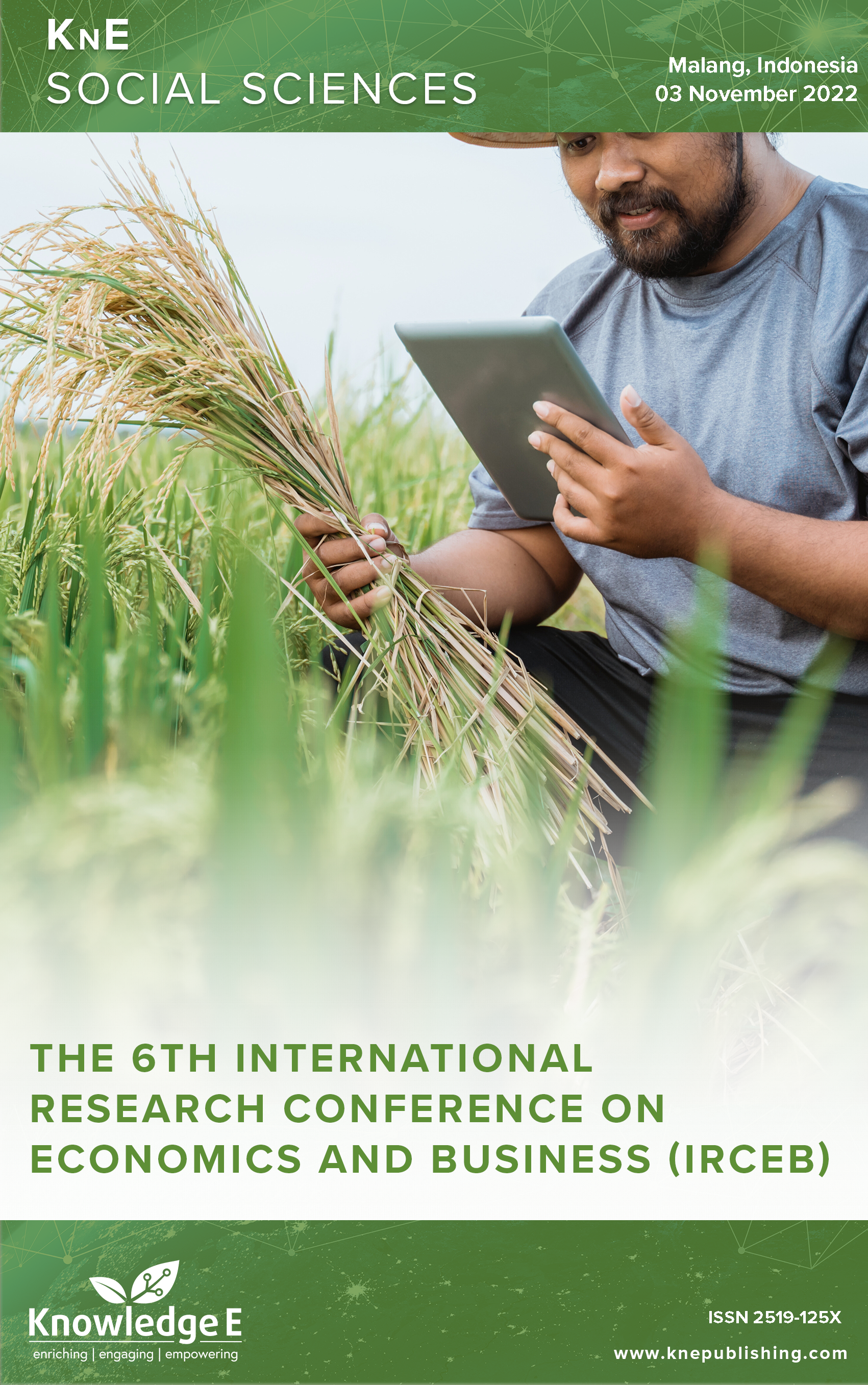Is the Oil Palm Land Efficient in Indonesia?
DOI:
https://doi.org/10.18502/kss.v9i4.15097Abstract
The plantation’s sub-contribution sector to the country’s gross domestic product reflects the role oil palm plantations have played in boosting the economy. The goal of this study is to examine land efficiency and the variables that affect its value in Indonesian national superior plantations, by the application of the Stochastic Frontier Analysis (SFA) method. Age, education, financial situation, and geographic location of the farmer all affect their engagement in agriculture, particularly when it comes to spreading new techniques. Therefore, policies that are based on input variables that demonstrate substantial outcomes in boosting the output of rubber plantations in Indonesia must be implemented by the government through certain institutions.
Keywords: palm oil, efficiency, Stochastic Frontier Analysis (SFA)
References
Dyah Wulan Sari AI, Tri H, Thinzar W. Analysis of factors affecting the technical inefficiency on Indonesia palm oil plantation. Sci Rep. 2022.
Aprilyani K, Nasution MP. Efficiency of using production factors in people’s palm oil farming (Elaeis Guineensis Jacq) (Case Study: Tanjung Medan Village, Kec. Kampung Rakyat, South Labuhanbatu Regency). Jurnal Agriuma. 2022. ISSN 2657-1749.
Casson A. The political economy of Indonesia’s oil palm sub-sector. In: Colfer CJ, Resosudarmo IA, editors. Which way forward? People, forests and policy making in Indonesia. Washington, D.C., USA: Resources for the Future; 2002. pp. 221–245.
Colchester M, Jiwan N, Sirait AM, Firdaus AY, Surambo A, Pane H. Promised land: palm oil and land acquisition in Indonesia: Implications for local communities and indigenous peoples. Forest Peoples Programme and Perkumpulan Sawit Watch, Moreton-inMarsh, UK and Bogor, Indonesia. 2006. [online] URL: http://www. forestpeoples.org/sites/fpp/files/publication/2010/08/promisedlandeng.pdf
Colchester M. Land acquisition, human rights violations, and indigenous peoples on the palm oil frontier. UK: Forest Peoples Programme, Moreton-in-Marsh; 2010.
Dessale M. Analysis of technical efficiency of small holder wheat-growing farmers of Jamma district, Ethiopia. Agric Food Secur. 2019;8(1):1–8. DOI: https://doi.org/10.1186/s40066-018-0250-9
Down To Earth. New investment law is not pro-poor. Down to Earth, No. 73 May. 2007. [online] URL: http://dte.gn.apc.org/73.pdf
Friends of the Earth Europe (FoE). Too green to be true: IOI Corporation in Ketapang District, West Kalimantan. Milieudefensie and Friends of the Earth Europe, Brussels, Belgium. 2010. [online] URL: http://www.foeeurope.org/publications/2010/Too_Green_to_be_True0310.pdf
Marti S. Losing ground: The human rights impacts of oil palm plantation expansion in Indonesia. Friends of the Earth, Life Mosaic and Sawit Watch, London, UK. 2008.
McCarthy JF. Processes of inclusion and adverse incorporation: Oil palm and agrarian change in Sumatra, Indonesia. Journal of Peasant Studies. 2010;37(4):821- 850. http://d x.doi.org/10.1080/03066150.2010.512460 DOI: https://doi.org/10.1080/03066150.2010.512460
Rivanda DR, Wini Nahraeni, Arti Yusdiarti. Technical efficiency analysis of paddy field rice farming (stochastic frontier approach) a case study with SL-PTT Farmers in Telagasari District Karawang Regency West Java Province. Jurnal AgribiSains. 2015 April;1(1). ISSN 2442-5982. DOI: https://doi.org/10.30997/jagi.v1i1.140
Sari DW, Khalifah NA, Suyanto S. The spillover effects of foreign direct investment on the firms’ productivity performances. J Prod Anal. 2016;46(2-3):199–233. DOI: https://doi.org/10.1007/s11123-016-0484-0
Sirait M. Indigenous peoples and oil palm plantation expansion in West Kalimantan, Indonesia. The Hague, the Netherlands: Universiteit van Amsterdam; 2009.
Telapak. Planting disaster: Biodiversity, social economy, and human rights issues in large-scale oil palm plantation in Indonesia. Telapak Indonesia, Bogor, Indonesia; 2000.
Tothmihaly A, Ingram V, von Cramon-Taubadel S. How can the environmental efficiency of Indonesian cocoa farms be increased? Ecological Economics. 2019;158( July 2018):134–145. https://doi.org/10.1016/j.ecolecon.2019.01.004 DOI: https://doi.org/10.1016/j.ecolecon.2019.01.004
Unjan R, Nissapa A, Phitthayaphinant P. An identification of impacts of area expansion policy of oil palm in Southern Thailand: A case study in Phatthalung and Nakhon Si Thammarat Provinces. Social and Behavioral Sciences. 2013;91:489496. http://doi.org/b9xt https://doi.org/10.1016/j.sbspro.2013.08.446 DOI: https://doi.org/10.1016/j.sbspro.2013.08.446

